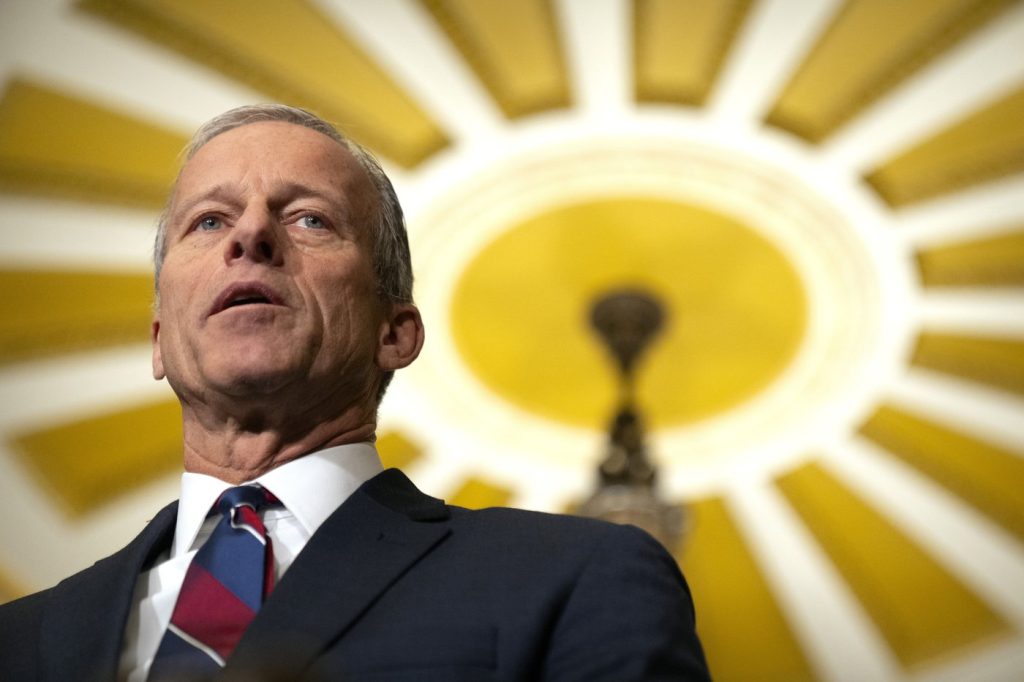The Senate is approaching a decisive vote on the Laken Riley Act, legislation that mandates the detention of migrants accused of theft and violent crimes. This act also grants states the authority to contest federal immigration policies, signaling a shift in immigration discourse as Donald Trump prepares to assume the presidency. The legislation is named after Laken Riley, a Georgia nursing student whose murder last year by a Venezuelan man underscored the Republicans' focus on crime associated with immigration.
With Republicans now holding the majority, the Laken Riley Act has become a legislative priority, clearing a significant procedural hurdle on Friday with a vote of 61-35. Notably, 10 Democrats joined Republicans in supporting the advancement of the bill, which may mark the first law Trump signs as president. This shift follows Democrats' prior hesitance to support similar measures, indicating a willingness to engage in discussions on immigration restrictions post-election losses.
Senate Majority Leader John Thune emphasized the voters’ demand for a change in immigration policies, which he identified as a key issue in November's elections. Republicans have challenged Democrats to unite with them in imposing stricter regulations on illegal immigration and addressing crimes committed by migrants. Most Senate Democrats had initially voted to initiate debate on the act but later pulled back support during the voting process as attempts to modify the bill were unsuccessful.
In the House of Representatives, all Republicans and 48 Democrats supported a comparable version of the legislation. Additionally, 61 Democrats backed another measure directed at the deportation of foreign nationals convicted of physical or sexual abuse. These developments have allowed Republicans to secure early legislative victories as they hold a trifecta of power across both chambers and the White House.
Despite the apparent support for the act, Democratic staff members of the Senate Appropriations Committee have estimated its cost to be $83 billion over the next three years. Republican leaders disputed this figure as they sought maximal funding under reconciliation rules, which would permit the administration to allocate up to $100 billion for border and immigration enforcement.
As Democrats deliberate over their stance on immigration, they are caught between factions prioritizing tougher restrictions and those advocating for assistance and protection for current migrants. Senator Chris Murphy, a Democrat from Connecticut, voiced concerns regarding the bill’s provision of prioritizing the detention of migrants accused of minor crimes like shoplifting. He criticized the act for potentially complicating the immigration system rather than streamlining it.
The Laken Riley Act has emerged as a focal point for Republican discourse surrounding immigration, prominently featuring Laken Riley's tragic death in its narrative. Jose Ibarra, the Venezuelan man convicted of her murder, had been allowed to remain in the U.S. while his immigration case was processed, leading to heightened scrutiny of immigration policies under previous administrations. In response, Senate Republicans have broadened the act’s scope to include migrants involved in serious crimes resulting in injury or death.
While Trump has frequently raised concerns about immigrant-related crime during his campaign, research indicates that immigrants overall commit crimes at lower rates than native-born citizens. Nonetheless, advocacy groups pushing for stricter immigration maintain their stance against prevailing studies suggesting otherwise. The legislation's most notable potential impact may come from its provision allowing state attorneys general to sue the federal government over immigration policy grievances, thus empowering states to redefine their immigration strategies in response to federal actions.
Democrats attempted to eliminate this contentious provision, arguing it could lead to extensive turmoil in immigration regulation amidst an already strained system. Kathleen Bush-Joseph, an attorney and policy analyst, remarked that increased litigation would further complicate an immigration framework that is already overwhelmed and in need of reform.










